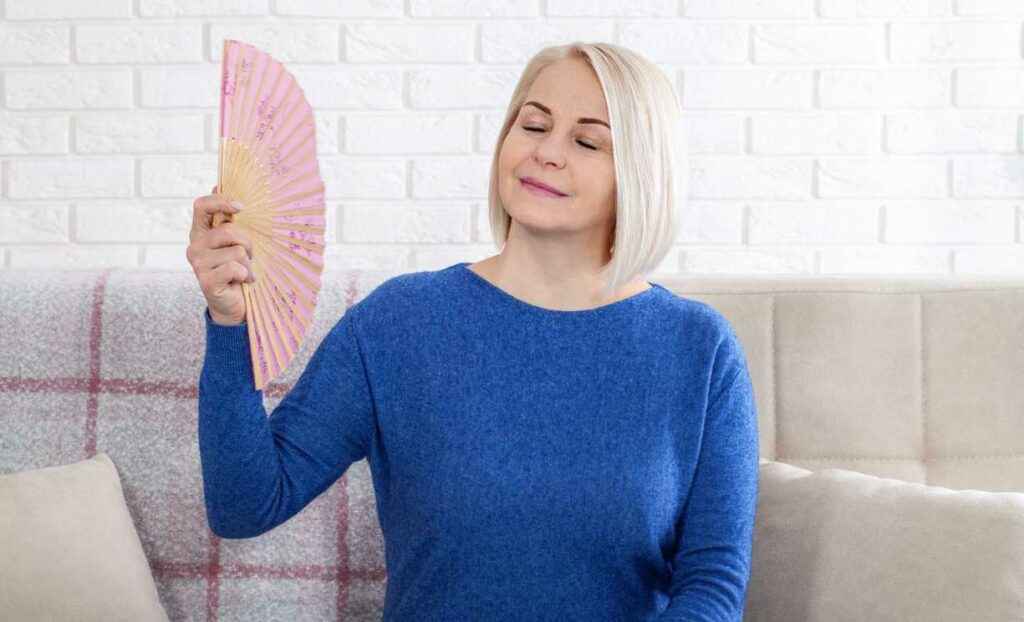Menopause is a natural phase in a woman’s life, but the accompanying symptoms, particularly hot flashes, can present significant challenges. Hot flashes, characterized by sudden feelings of intense heat and sweating, are a common and often bothersome symptom during menopause. In this blog, we explore hot flash treatment and lifestyle adjustments that can bring relief to those experiencing hot flashes, helping women navigate this aspect of menopause with greater comfort.
Contents
What Are Hot Flashes?
Hot flashes are a common and often uncomfortable symptom experienced by women, particularly during menopause. Imagine feeling an unexpected surge of intense heat spreading through your body, causing your face and neck to become flushed and leading to sudden sweating. This is a hot flash. These episodes can be brief but intense, disrupting daily activities and even impacting sleep.
Hot flashes are triggered by hormonal changes, specifically the decrease in estrogen levels during menopause. While not all women experience hot flashes, those who do may find them to be one of the more noticeable and bothersome aspects of the menopausal transition. Understanding these episodes and exploring ways to manage them can greatly contribute to a woman’s overall comfort during this natural phase of life.
What Causes Hot Flashes?
Hot flashes, a common symptom during menopause, are primarily caused by hormonal changes, specifically the decline in estrogen levels. Estrogen plays a crucial role in regulating body temperature, and when its levels drop, the hypothalamus, the part of the brain responsible for temperature control, can become more sensitive. This heightened sensitivity triggers the body’s cooling mechanisms in response to perceived overheating, leading to a hot flash.
The blood vessels near the skin’s surface dilate to release heat, causing the sudden sensation of intense warmth, flushing of the face and upper body, and sometimes accompanied by sweating. While hormonal shifts are the primary cause, other factors such as stress, anxiety, certain medications, and lifestyle habits can also contribute to the frequency and intensity of hot flashes during menopause. Understanding these underlying causes is key to effectively managing and alleviating this common menopausal symptom.
Treatment For Hot Flashes
The treatment for hot flashes varies, and individuals may find relief through different approaches. Here are common strategies and treatments for managing hot flashes:
- Hormone Replacement Therapy (HRT): Hormone replacement therapy, involving the use of estrogen or a combination of estrogen and progesterone, is a highly effective treatment for hot flashes. However, its use is associated with certain risks, and the decision should be made in consultation with a healthcare provider.
- Non-Hormonal Medications: Certain medications, including antidepressants like selective serotonin reuptake inhibitors (SSRIs) and serotonin-norepinephrine reuptake inhibitors (SNRIs), can help reduce the frequency and severity of hot flashes. Consult with a healthcare provider to explore suitable options.
- Lifestyle Modifications: Making simple lifestyle changes can significantly impact hot flashes. These include dressing in layers to easily adjust to temperature changes, staying well-hydrated by drinking cool water regularly, avoiding triggers like spicy foods, caffeine, and alcohol.
- Mind-Body Techniques: Mindfulness-based practices, such as deep breathing exercises, meditation, and yoga, can help manage stress and reduce the occurrence of hot flashes.
- Cooling Techniques: Using cooling products, such as fans, cooling pillows, or wearable cooling devices, can provide relief during hot flashes. Keeping the bedroom cool at night can also improve sleep quality.
- Acupuncture: Some women find relief from hot flashes through acupuncture, a traditional Chinese medicine practice involving the insertion of thin needles into specific points on the body.
- Herbal Supplements: Certain herbal supplements, like black cohosh and soy isoflavones, are thought to have the potential to alleviate hot flashes. However, their efficacy varies, and it’s crucial to consult with a healthcare provider before using supplements.
- Regular Exercise: Engaging in regular physical activity, including both aerobic exercises and strength training, has been associated with a reduction in hot flash frequency. Exercise contributes to overall well-being.
Home Remedies For Hot Flashes
While medical interventions can help manage hot flashes, some individuals may also find relief through home remedies. Here are several home-based strategies that may help alleviate the frequency and intensity of hot flashes:
- Cooling Techniques: Keep your living space cool by using fans or air conditioning. Consider carrying a portable fan for quick cooling when needed.
- Layered Clothing: Dress in layers to easily adjust to temperature changes. This allows you to remove clothing when a hot flash occurs and add layers as needed.
- Stay Hydrated: Drink cool water regularly to stay hydrated. Cold water can be particularly refreshing during hot flashes.
- Cooling Bedding: Use moisture-wicking sheets and bedding to help regulate body temperature during sleep. Consider keeping a cool gel pillow nearby.
- Herbal Teas: Some herbal teas, such as sage and peppermint, are thought to have cooling properties. Sipping on these teas may provide a soothing effect.
- Flaxseed: Incorporate ground flaxseed into your diet. Flaxseed contains compounds that may help regulate hormonal fluctuations associated with hot flashes.
- Deep Breathing and Relaxation Techniques: Practice deep breathing exercises and relaxation techniques to manage stress, which can trigger hot flashes. Mind-body practices like yoga and meditation may be beneficial.
- Acupuncture Pressure Points: Explore acupuncture pressure points. Gently massaging or applying pressure to specific points on the body may offer relief for some individuals.
- Cold Compress: Apply a cold compress to the neck or wrists during a hot flash. This can help cool the body quickly.
- Regular Exercise: Engage in regular physical activity. Exercise has been linked to a reduction in the frequency and severity of hot flashes. Choose activities you enjoy, such as walking, swimming, or dancing.
When To See A Doctor?
Experiencing hot flashes during menopause is a common aspect of the natural aging process for many women. While these flashes of intense heat and sweating are often manageable, there are specific instances when seeking medical advice is crucial. If the severity of hot flashes is notably high or if they significantly impact daily life, it is advisable to consult with a healthcare professional. Persistent and intense hot flashes may indicate the need for further evaluation to explore potential underlying causes.
If you have concerns about other health conditions or experience new symptoms alongside hot flashes, such as chest pain, heart palpitations, or unusual bleeding, seeking prompt medical attention is crucial. It’s essential to rule out other health issues and address any potential underlying causes of these symptoms. If menopausal symptoms, including hot flashes, begin before the age of 40, it is crucial to consult with a doctor.
Conclusion
In conclusion, addressing and managing hot flashes during menopause involves a multifaceted approach that considers both medical interventions and lifestyle adjustments. The journey to find effective hot flash treatment is unique for each individual, and it often requires a combination of strategies tailored to specific needs and preferences. From hormone replacement therapy and non-hormonal medications to lifestyle modifications such as staying hydrated, dressing in layers, and practicing stress-reducing techniques, there is a range of options available.
If you are facing menopause related issues, menopause treatment at HerMantra can help. Book your free trial online menopause treatment session now.





